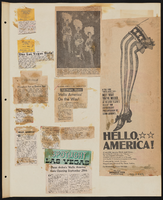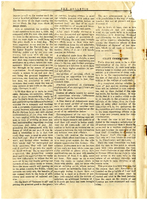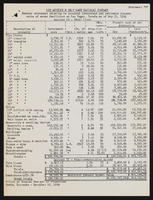Search the Special Collections and Archives Portal
Search Results
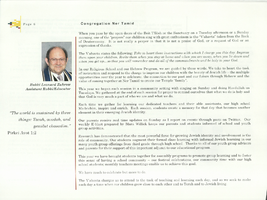
Annual report from Congregation Ner Tamid, 2010-2011
Date
Archival Collection
Description
Annual report from Congregation Ner Tamid, 2010-2011
Text

Gabriel Garcia oral history interview: transcript
Date
Archival Collection
Description
Oral history interview with Gabriel Garcia conducted by Monserrath Hernandez and Barbara Tabach on November 13, 2019 for the Latinx Voices of Southern Nevada Oral History Project. In this interview, Garcia discusses his early life in Arizona and moving to Las Vegas, Nevada in 1984. He remembers attending a sixth grade center, the Pacific Engineering and Production Company of Nevada (PEPCON) explosion, and attending Las Vegas High School. Garcia talks about Mexican culture in Las Vegas, car clubs, and becoming a graphic designer. Lastly, Garcia discusses his involvement with the Association of Latino Professionals for America, and the idea of diversifying the professional workplace.
Text
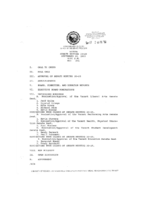
Meeting minutes for Consolidated Student Senate University of Nevada, Las Vegas, September 20, 1990
Date
Archival Collection
Description
Text
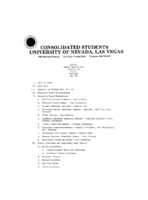
Meeting minutes for Consolidated Student Senate, University of Nevada, Las Vegas, September 7, 1982
Date
Archival Collection
Description
Text
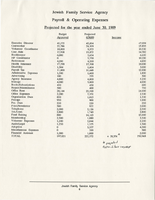
Orientation manual of the Jewish Family Service Agency of Clark County, 1989
Date
Archival Collection
Description
The orientation manual of the Jewish Family Service Agency provides guidance for the duties of the board of directors, the operation of the agency, the organization chart, and staff listing. It also outlines the role of volunteers in the agency.
Text
John Wittwer Collection on Agriculture in Nevada
Identifier
Abstract
The John Wittwer Collection on Agriculture in Nevada (1898-1972) contains the professional papers and records of John Wittwer in his capacity as an Agricultural Extension agent for the University of Nevada from 1921 to 1954. The records are primarily annual reports containing text, photographs, newspaper clippings, and charts that provide a rich chronicle of the conditions of agriculture and ranching in southern Nevada from 1898 to 1972, with the bulk of the material dating from 1929 to 1955. These conditions span water issues, such as flood control and irrigation, to the general difficulties of sustaining agriculture and viable food production in a desert environment. The reports come from the Agricultural Experiment Stations in Clark and Lincoln counties and most contain both a statistical report and a narrative summary.
Archival Collection
Mabel Hoggard Papers
Identifier
Abstract
The Mabel Hoggard Papers (1903-2011) contain materials related to Hoggard's career as a Las Vegas, Nevada elementary school teacher, her research and civic interests in Las Vegas's predominantly African American Westside communities, and her engagement with civil rights issues. The collection also contains materials about Hoggard's life, including biographical newspaper articles about her childhood, education, work, and family. The collection includes lesson plans, scrapbooks, awards, correspondence, photographs, and physical objects such as a vinyl record and political pins. The bulk of the collection focuses on her life in Las Vegas from approximately 1946-1989.
Archival Collection

